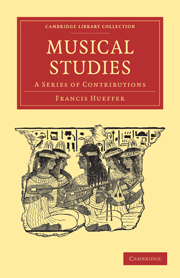Summary
Germany is the country of philosophy and of music. But the philosophy of music has been strangely neglected by its deepest thinkers. Even Leibnitz saw in music nothing but an “exercitium arithmetics occultum nescientis se numerare animi;” and the views of subsequent philosophers, although more speciously worded, do not approach the essence of the art more closely. Arthur Schopenhauer, the greatest philosopher Germany has produced since Kant, was the first to pierce the clouds obscuring this most ethereal of arts, and for this reason alone he deserves the attention of all intelligent musicians. But his connection with the development of modern music is of a still more intimate kind. It is known that Wagner adopted the results of Schopenhauer's philosophy, and he has indeed been called “the musical expounder of pessimism.” This, of course, is absurd. Music or any other art cannot be made the medium of any philosophical or religious doctrine whatsoever — not, at least, without serious detriment to its purity and power. At the same time, it is not without significance that the greatest modern musician is, as it were, steeped in the doctrines of this remarkable modern thinker.
The association of the two men becomes still more interesting when their respective individualities are considered. The admiration expressed by the composer for the philosopher was altogether onesided. Schopenhauer entirely failed to discover the beauty of Wagner's music — a want of perception which, in other cases, the composer has not shown himself willing to forgive.
- Type
- Chapter
- Information
- Musical StudiesA Series of Contributions, pp. 85 - 129Publisher: Cambridge University PressPrint publication year: 2009First published in: 1880



